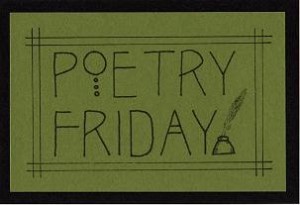 It’s Poetry Friday, and this week I want to talk about a poem I love, in a book I love, even though I only read it for the first time this week.
It’s Poetry Friday, and this week I want to talk about a poem I love, in a book I love, even though I only read it for the first time this week.
Perhaps the book first. I bought Brown Girl Dreaming as a gift for myself for Christmas, because I’d heard so many wonderful things about it. Since Christmas I’ve been busy and hadn’t got around to reading it until Myra at Gathering Books shared her responses last Friday, which reminded me to make time to read it for myself – and boy am I glad I did.
Brown Girl Dreaming, by Jacqueline Woodson is an autobiographical verse  novel. Woodson allows us to grow up with her, sharing the story of her childhood and what it was like growing up as an African American child in the 1960s. Through the eyes of a child we see the civil rights movement, feelings of difference and a search for identity – as well as good times with family and friends. As an Australian reader I learnt a lot about the time period, and about Woodson’s life, but I also felt that this was not just a book about the United States, or about that particular time period. By connecting with Woodson’s story we also have the opportunity to connect with the experiences of people the world over. It is a universal story just as much as it is a very poignant personal one.
novel. Woodson allows us to grow up with her, sharing the story of her childhood and what it was like growing up as an African American child in the 1960s. Through the eyes of a child we see the civil rights movement, feelings of difference and a search for identity – as well as good times with family and friends. As an Australian reader I learnt a lot about the time period, and about Woodson’s life, but I also felt that this was not just a book about the United States, or about that particular time period. By connecting with Woodson’s story we also have the opportunity to connect with the experiences of people the world over. It is a universal story just as much as it is a very poignant personal one.
Onto the poem. As well as the themes and subjects I’ve mentioned above, Brown Girl Dreaming also traces Woodson’s early development as a writer – from being given a composition book before she could write, to the joy of being able to write her own name, to her early attempts to write poems and stories. From a young age, she knew she wanted to be writer. My favourite poem of the book, I think (though I bookmarked a dozen) is called ‘When I tell My Family’, and tells of how Woodson’s family react when she tells them she wants to be a writer:
It’s a good hobby, we see how quiet it keeps you.
They say,
But maybe you should be a teacher,
a lawyer,
do hair …
I’ll think about it, I say.
And maybe all of us know
this is just another one of my
stories.
(Jacqueline Woodson, Brown Girl Dreaming, 214, p. 229)
I love the way Woodson shares this moment (I suspect there were many of these moments) through the eyes of her child self. She doesn’t editorialise or tell us that the adults were wrong. She doesn’t say that she was hurt or angry by the adult responses.
Like Woodson, I knew from a young age that I wanted to be a writer, and I had moments like these, too. When I read this poem, I marvelled at how Woodson manages to show us her response so eloquently in those last three lines.
If you haven’t read Brown Girl Dreaming, you are missing out on a beautiful verse novel.
Want more poetry? This week’s Poetry Friday roundup is at Live Your Poem.
Considering you have read through books, which other people have not read and most likely few others have actually heard of, what’s significant, is the fact you’ve entered into them and come out of that encounter enriched for it. Growing as you become emboldened by the experience of participating in a different perspective for a while, this is the real strength of an excellent book!